Newsletter
Weibo Watch: The “Subway Judge”
From Subway Judge to Diving Grandpas, these were the main topics that mattered on Chinese social media recently.
Published
2 years agoon

PREMIUM NEWSLETTER | ISSUE #13
This week’s newsletter:
◼︎ 1. Editor’s Note – The Subway Judge
◼︎ 2. What’s Trending – A closer look at the featured stories
◼︎ 3. What More to Know – Highlighting 8 hot topics
◼︎ 4. What Lies Behind – Beyond Huawei’s latest release
◼︎ 5. What’s Noteworthy – Digging through the Great Wall
◼︎ 6. What’s Popular – Oppenheimer, censored
◼︎ 7. What’s Memorable – Kimono problems
◼︎ 8. Weibo Word of the Week – “Anti-Radiation”
Featured header contains a meme that has spread online, posted by account @肉肉杀手zz
Dear Reader,
A new character was added to China’s memeverse this week. He is called the ‘Subway Judge’ (Dìtiě Pànguān, 地铁判官), a young man who gained notoriety for an incident that occurred on a Qingdao subway this week.
In a video of the incident that went completely viral on Chinese social media, an elderly man and a woman got into an argument with another female passenger over seating arrangements. The woman was accused of taking up two seats, which infuriated the man, prompting him to shout, “So I can take ten seats if I want!”
In this moment, the young man, wearing a Vans t-shirt, approached the scene upon hearing the commotion and he seemingly intervened in the name of justice: he looked at the elderly man in disbelief upon hearing him yell about taking ten seats. Without hesitation, he slapped the elderly man on the cheek and then walked away, leaving everyone bewildered.

The Subway Judge meme: within that brief moment, he transitioned from confusion, assessing the situation, to decisively making up his mind, and taking action when seeing ‘injustice.’
It is this moment, just a mere few seconds, that made the young man instantly famous, and he was hailed as a hero for daring to step up when witnessing injustice, for confronting an elderly, for daring to handing out a slap when people are behaving uncivilized in public spaces -especially on public transport. The incident sparked a series of memes, and the T-shirt worn by the young man soon sold out on Taobao.
In some memes, the ‘Subway Judge’ was depicted with a crescent moon on his forehead, like Bao Zheng (包拯), a Chinese historical figure who is known as one of China’s most celebrated upright and just officials who even dared to contradict the emperor.
The praise for the “Subway Judge” mirrors the exasperation and powerlessness many feel in the face of uncivilized conduct in public places. It’s precisely because his actions are so unusual – who among the younger generation would dare to deliver a slap to an elderly individual’s face?! – that they resonate with younger people, who find it refreshing to witness such a bold and unconventional response.
One account pretending to be the “Subway Judge” wrote down the basics of his character: “First! Never act on impulse. Second! Never let any wrongdoing slip through. Third! Ensure the absolute fairness of judgment. The Subway Righteous Judge (地铁正义判官) is here to make a righteous appearance!” Some vloggers have even gone out in public pretending to be the ‘Subway Judge.’

Various Subway Judge memes.
As usually happens when small incidents go viral so fast, the real circumstances behind the meme are overlooked. The elderly man had not meant his words to be taken so literally; the younger man had misunderstood the situation; and physical violence should not be praised. The incident’s aftermath involved the elderly man filing a police report. Local authorities have stated that the man who slapped him has mental health issues, and that both parties have now reached an agreement, resolving the issue.
Meanwhile, the legacy of the Subway Judge lives on in China’s online meme culture.
Isn’t it ironic that in this time when people are desperately searching for common sense, boldness, and a fresh perspective, the individual hailed as a hero turns out to be struggling with ‘mental illness’? Perhaps it’s indicative of the times we live in, prompting us to question who the ‘sick’ ones actually are. Maybe we all need a slap of reality.
Miranda Barnes and Ruixin Zhang have contributed to this week’s newsletter.
Best,
Manya (@manyapan)
PS In case you missed it, some of the viral videos I tweeted about this week:
➡️ The viral moment in the Qingdao subway.
➡️ It seems that Jay Chou’s concerts in Tianjin were quite spectacular. The Tianjin Olympic Center, with a capacity of 54,696 seats, provided an impressive venue. According to a previous report by GT, a whopping 5.2 million people had expressed their interest in attending one of Jay’s four Tianjin concerts, with the final one happening today. Remarkably, around 130,000 tickets were sold within just 30 seconds after becoming available for purchase.
➡️ Amid discussions over draft law banning clothes harmful to the “spirit, feelings of the Chinese nation,” this incident sparked discussions: Chinese wearing Tang clothes were denied entry at Panlongcheng Park, Wuhan, after local guard mistook their clothes for Japanese attire. Watch video here.
➡️ Shinjuku restaurant puts up a sign saying all their food comes from Fukushima. This Chinese vlogger feels wronged and calls the police. Video with subtitles.
➡️ And some viral pictures showed that not everyone is appreciating the latest collaboration hype between Luckin coffee and Maotai liquor.
What’s Trending

1: From Baijiu Latte to DIY Liquor Coffee | Would you like a shot with that? China’s coffee culture is brewing up something new as it embraces the fusion of coffee and alcohol. This blossoming trend, such a hot topic online this week thanks to the hyped Luckin x Maotai collaboration, is sparking curiosity and discussions about its lasting impact on coffee culture in China.

2: A Different Eco-anxiety Discourse | This year, as China faced extreme heat and severe floods, various English-language media outlets noticed a lack of public discourse on climate change in China. Unlike the West, where discussions on extreme weather link to human-caused climate change, China doesn’t often connect global warming to its carbon emissions or manufacturing practices. Instead, concerns about ecological challenges and the future are directed toward different topics. In our recent article, we explore how climate change, global warming, and environmental activism may not be as prominent in daily life and online media in China as in the West, but certain ecological topics, often promoted by state media and amplified by the public, gain all the more attention.
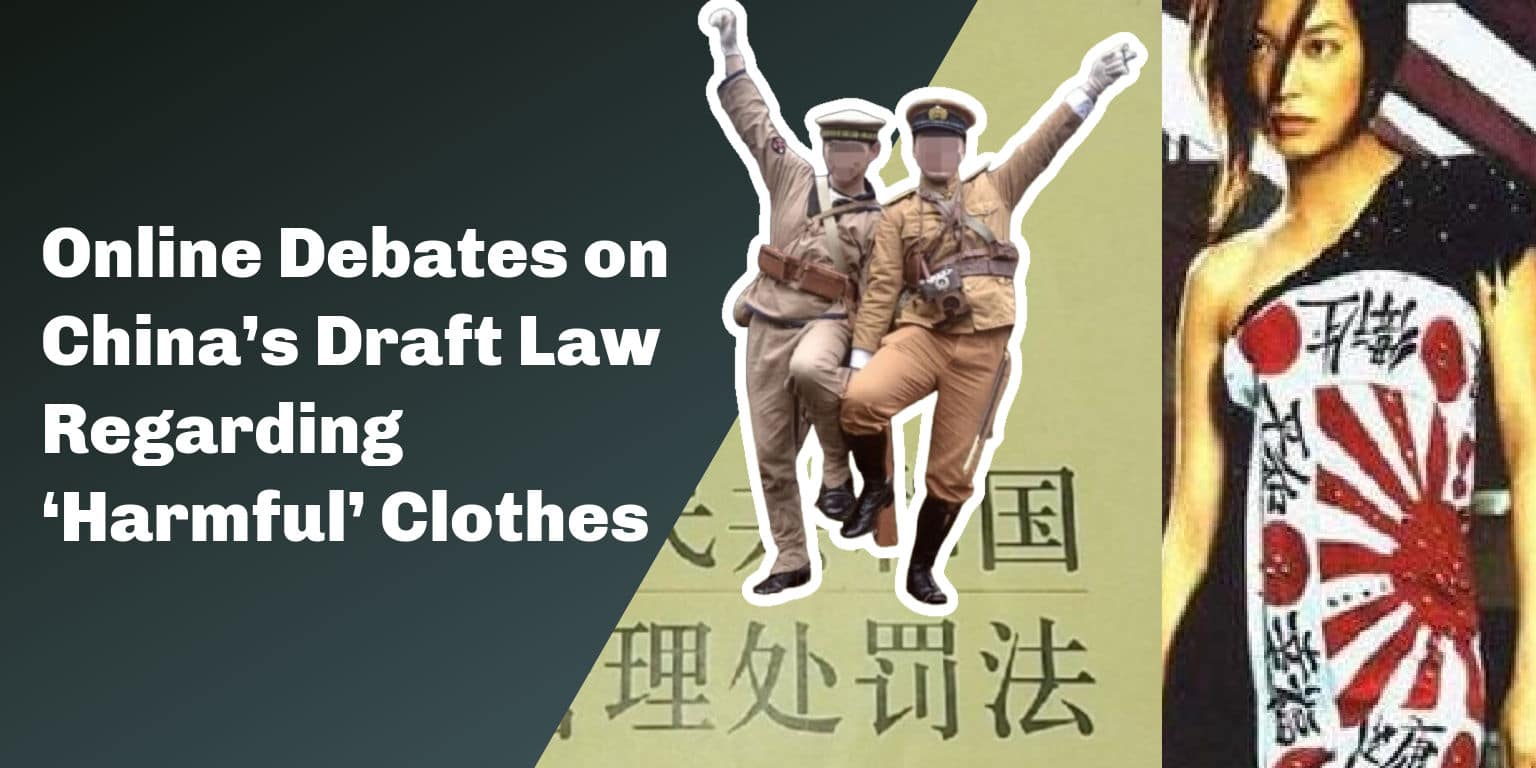
3: Cultural Sensitivities vs. Personal Freedom: | China’s recent proposal to ban clothing that “hurts national feelings” has triggered social media debates about freedom of dress and cultural sensitivities. The controversial amendment has raised questions about who decides what’s offensive for which reason. While some argue for the significance of protecting national pride, others emphasize the value of personal expression. Amid these discussions, an incident sparked discussions: Chinese wearing Tang clothes were denied entry at Panlongcheng Park, Wuhan, after local guard mistook their clothes for Japanese attire (see video).
What More to Know

Tianjin’s diving grandpas had to stop their diving activities after rising to internet fame, causing too many people to dive into the river.
◼︎ 1. G20 without Xi. While the BRICS Summit was one of the hot topics mentioned in our previous Weibo Watch newsletter, the G20 (二十国集团) in India is the big international event that is receiving the most attention this week. The most noteworthy issue about it is that Xi Jinping is not attending the summit, held between 9–10 September, even though he has never missed a G20 summit before. Instead, Premier of the State Council Li Qiang (李强) is attending the meetings, and he called for solidarity and cooperation, and a strengthened coordination of macroeconomic policies on Saturday. (Hashtag “G20 summit” #g20峰会#, 310 million views).
◼︎ 2. Morocco Earthquake. The major earthquake in Morocco has been dominating headlines all over the world, and is also a big topic on Weibo. At least 2,012 people have been killed and 2,059 injured in Friday’s devastating earthquake. Xi Jinping extended China’s condolences to the King of Morocco. After the devastating earthquake that hit southern Turkey and northern Syria in February of this year, various rescue groups from all over China came to assist in the quake-hit areas. (Weibo hashtag: “Morocco 6.9-Magnitude Earthquake” #摩洛哥6.9级地震#, 120 million views.)
◼︎ 3. Extreme Rain & Floods. Over the past week, Hong Kong and Shenzhen experienced the most severe rainfall on record, causing traffic problems, school and office closures, and ongoing flood concerns. This heavy rain was a result of the lingering impact of Typhoon Haikui, which had struck Taiwan, Fujian, and Guangdong earlier in the week. With a red alert (the highest warning level) in place on Friday, local authorities urged residents to stay home and reach out to official channels for assistance if needed. (Weibo hashtags “Shenzhen Rainstorms” #深圳暴雨#, 2 billion views; “Hong Kong Torrential Rains” #香港暴雨#, 280 million views).
◼︎ 4. Girl Hospitalized with Skull Fracture Following Teacher’s Attack. A disturbing incident has captured the attention of Chinese social media this week as a 9-year-old girl in Changsha city was admitted to the hospital after being assaulted by her teacher. The incident transpired during an after-school activity when the 40-year-old teacher reportedly used a glass ruler to strike the student in an attempt to ‘maintain order.’ The girl, who sustained a fractured skull, has regained consciousness following surgery. The teacher has been detained pending an investigation into the incident. (Hashtag “Teacher under Public Security Investigation for Fracturing Student’s Skull #公安介入调查老师打碎学生头骨#, 130 million views; Female Student Whose Skull was Fractured by Teacher has Awaken #被老师打破头骨女生已清醒#, 180 million views).
◼︎ 5. Tianjin’s Diving Grandpas Tell People To Stop Diving. Recently, Tianjin’s “diving grandpas” have gained significant attention for their daring dives into the river from the Stone Lion Forest Bridge (狮子林桥), becoming an internet sensation. The elderly men, who have ample experience, have now called on the public to stop coming to Tianjin to imitate their actions, as it is leading to social media influencers flocking to the bridge to dive, causing dangerous situations. While the city authorities are now investigating the safety of the site, the grandpas also have stopped their diving activities after thirty years. It’s the downside of internet fame! (Hashtag: “Tianjin ‘Uncles’ Announce Withdrawal from Lion Forest Bridge Diving” #天津大爷们宣布退出狮子林桥跳水#, 180 million views)
◼︎ 6. CNKI Fined. China’s Cyberspace Administration has taken legal action against the private-owned publishing company CNKI (China National Knowledge Infrastructure) for unlawfully collecting personal data. CNKI allegedly collected personal information without obtaining consent, failed to provide clear disclosure of its data collection policies, and neglected to delete user personal data upon account cancellation. As a result, CNKI has been instructed to halt its illegal handling of personal information and has been fined 50 million RMB (approximately $6 million USD). (Weibo hasthag #知网被罚款5000万元#, 160 million views)
◼︎ 7. Weibo Bans Crypto Influencers. This week, China’s tightening grip on cryptocurrency activities became more evident as Weibo removed the accounts of 80 cryptocurrency influencers, each with over 8 million followers, as reported by the South China Morning Post (SCMP). This move follows a broader crackdown initiated in August 2022 when the Cyberspace Administration of China removed thousands of crypto-related accounts and posts promoting virtual assets. Weibo had previously banned prominent figures like Binance co-founder Yi He and cryptocurrency entrepreneur Justin Sun as part of the government’s efforts to regulate the virtual asset industry, which began in 2019. In September 2021, ten Chinese government agencies collectively declared numerous cryptocurrency-related activities as illegal financial practices. (Read the SCMP report here).
◼︎ 8. Controversial “Drink Milk” Plan for Students. A school in Suiping County, Henan, sparked controversy recently when a teacher required parents to provide medical documentation proving their child’s inability to consume milk if they chose not to subscribe to the school’s milk program. China introduced the National School Milk Programme (学生饮用奶计划) in 2000 to encourage dairy consumption for students’ healthy growth, but participation is meant to be voluntary. This incident brought attention to the issue of “hidden costs” within China’s education system and the pressure placed on parents to cover various expenses, some of which may involve commissions for the school. The school later clarified that the requirement regarding the milk was an individual initiative by one of their teachers, and that appropriate action had been taken, including reprimanding the teacher for their actions. (Weibo hashtag “Students Who Don’t Subscribe to Milk Need Proof of Hospital Diagnosis” #学生不订奶要开县级医院以上诊断证明#, 160 million views).
What’s Behind the Headlines

Beyond Huawei’s Mate60 Release
The early release of the latest Huawei smartphone Mate60 Pro on August 28th sparked a wide range of online discussions this week. As the phone is believed to be armed with homegrown cutting-edge technology, Chinese tech bloggers rushed to get their hands on the Mate60 Pro to present their followers with their detailed analysis of the piece. Some videos on this topic garnered over 100 million views within a single day.
While many Chinese consumers are excited about the technological aspects, Huawei’s actions are also scrutinized in the context of China-US geopolitical tensions. The surprising release without a traditional press conference coincided with the visit of US Secretary of Commerce Gina Raimondo to China. The Mate60 Pro, equipped with the Kirin 9000s chip, a domestic 7 nanometer (nm) innovation, is seen by some as a response to US tech sanctions. People analyzed details to ascertain if the timing was intentional. Some noted that Chinese Premier Li Qiang had visited several tech firms in Shenzhen, including Huawei, just a week before Raimondo’s scheduled visit. Others observed that a Weibo post from an account widely believed to represent China’s state media (央视新闻) featured a watermark of the Huawei Mate60 Pro on the same day as Raimondo’s press conference in Shanghai, which was the day after the new phone’s launch. Many view this as a display of China’s confidence in its tech capabilities despite US sanctions, and they humorously portrayed Raimondo as the best ambassador for the Huawei Mate60 Pro through memes.
Simultaneously, some expressed frustration that the West appeared relatively quiet as China is making strides in chip development. They were eager to see how the West would react. However, after the initial week, some Western reactions did come to the forefront. During the same week, news emerged that China was prohibiting certain civil service and government officials from using iPhones. The hashtag “Will you switch from iPhone to Huawei this year?” (“今年你会从iPhone转华为吗”) ranked second on the hot search lists and received nearly 180 million views. People appear to be rooting for more than just the latest Huawei smartphone; it’s become a symbol of technological independence.
What’s Noteworthy

Digging through Historical Heritage | Two construction workers from Inner Mongolia were working at a construction site near the Great Wall when they decided to use their excavator to dig through the Ming Wall in order to create a 5-meter wide shortcut and save some time on their construction work. In doing so, they caused irreversible damage to the cultural heritage site. Commenters on Weibo suggest the two construction workers deserve an “ancient punishment” for ruining such ancient heritage.
What’s Popular

My Censorship is Better than Yours | Christopher Nolan’s summer blockbuster has finally hit the screens in China, five weeks after it was first released in the United States and several other countries. While the movie was a hot topic online, Chinese cinemagoers noticed that a nude Florence Pugh, who plays Jean Tatlock, is wearing a computer-generated black dress in China’s version of Oppenheimer. Instead of criticizing the censorship, many people praised the little black dress, suggesting China’s editing is better than India’s.
What’s Memorable
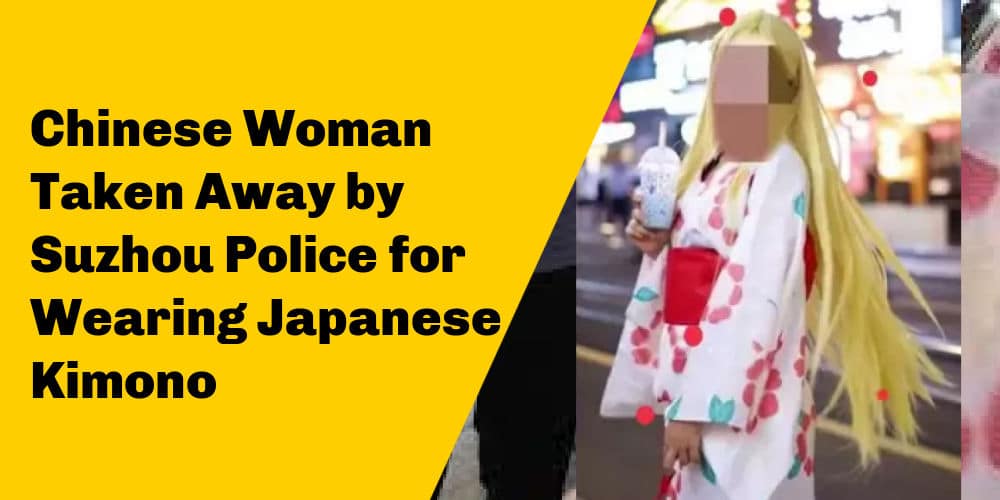
Fashion Police This week, there has been significant discussion surrounding a proposed amendment to China’s Public Security Law, which includes provisions for banning clothing deemed “harmful” to “the spirit and sentiments of the Chinese nation.” This controversial topic (read) has ignited debates about the implications of having actual ‘fashion police’ in China, raising questions about what attire would be permissible and what would not.
This situation harks back to a noteworthy incident from last summer when a young Chinese female cosplayer, dressed in a Japanese summer kimono while taking photos in Suzhou’s ‘Little Tokyo’ area, was detained by local police for allegedly ‘provoking trouble.’ While some argued that wearing Japanese clothing near a sensitive date like August 15 (Victory over Japan) might not be appropriate, many voices defended the woman’s right to wear whatever she chose, including a Japanese summer yukata.
Weibo Word of the Week

“Anti Radiation” | Our Weibo Word of the Week is “防辐射” (fáng fúshè), which translates to “protect against radiation” or “anti-radiation.”
Since Japan began releasing treated radioactive water from the damaged Fukushima power plant into the ocean, various related discussions have surged across Chinese social media platforms. Concerned netizens are actively seeking ways to safeguard themselves against potential radiation risks. Some are sharing advice on foods believed to offer protection against radiation exposure.

The term “anti-radiation” has gained significant popularity on the Baidu search engine, experiencing a 3083% surge in searches compared to the previous month.
Simultaneously, certain businesses have attempted to profit from these radiation concerns. One Japanese-style restaurant in Shanghai’s Hongqiao area recently stirred controversy by offering an “anti-radiation” set meal (“防辐射”套餐). This meal, initially introduced on the online platform Dianping, featured ingredients like tomatoes, edamame, tofu, and spinach. Read more about this in our article here.
This is an on-site version of the Weibo Watch newsletter by What’s on Weibo. Missed last week’s newsletter? Find it here. If you are already subscribed to What’s on Weibo but are not yet receiving this newsletter in your inbox, please contact us directly to let us know.
;
Stories that are authored by the What's on Weibo Team are the stories that multiple authors contributed to. Please check the names at the end of the articles to see who the authors are.

You may like
China Media
IShowSpeed in China: Streaming China’s Stories Well
Published
4 months agoon
March 30, 2025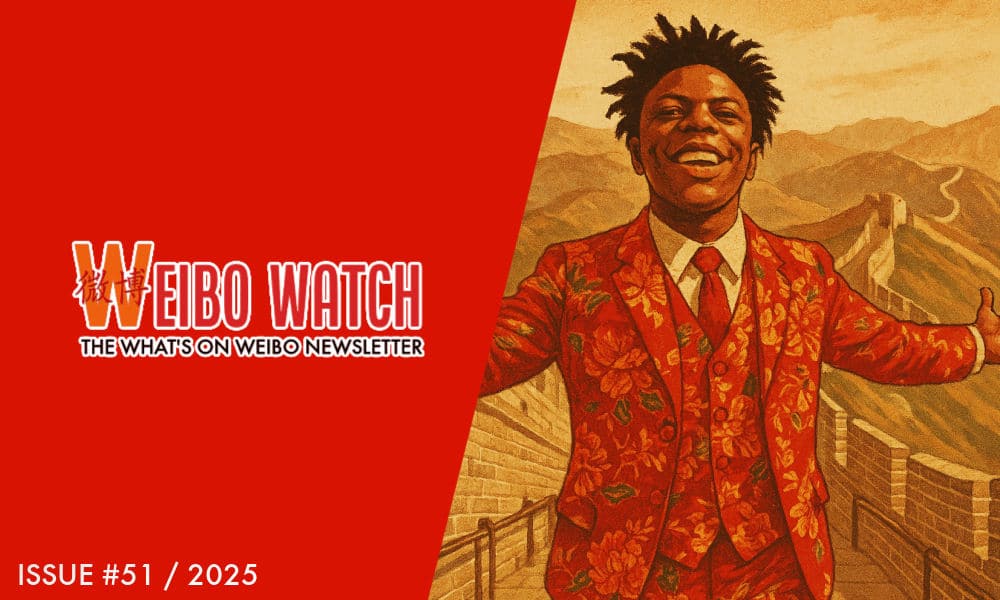
“This man is doing God’s work. In just six hours, he eliminated all Western media propaganda about China,” Chinese influencer Li Sanjin (李三金) said in one of his videos this week. The man he referred to, allegedly doing ‘God’s work,’ is the American YouTuber and online streamer Darren Watkins, better known as IShowSpeed or Speed, who visited China this week and livestreamed from various locations.
With 37 million followers on his YouTube account, Watkins’ visit hasn’t exactly flown under the radar. His streams from China have already accumulated over 17.5 million views on YouTube alone, and he also became the talk of the week on Chinese social media.
In China, the 20-year-old IShowSpeed is known as Jiǎkànggē (甲亢哥), or “Hyper Bro,” since the immensely popular YouTube star is known for being highly energetic.
Although IShowSpeed is originally known for soccer and gaming-related content, he’s been streaming live from various countries over the past year, from Ecuador to Bolivia, from Australia to Indonesia, from Romania to Japan, and also from the Netherlands, where a mob of fans harassed the YouTuber to such an extent that the influencer fled and panicked, until the police intervened and asked him to shut down the livestream for safety reasons — which he did not comply with.
It was not the only time IShowSpeed’s visit got chaotic. He also got into trouble during livestreams from other countries. While streaming from Norway, he injured his ankle and was swarmed by a crowd while trying to get out. In Greece and Indonesia, he had to ask for police support as well. In Thailand, he crashed a tuk-tuk into a temple wall.
In China, IShowSpeed’s livestreams went far more smoothly, and netizens, state media, and other official channels raved about his visit and its favorable portrayal of the country and its culture.
🔹 Symbol of Cultural Exchange & Positive Diplomacy
“Jiǎkànggē” became one of the viral terms of the week, on Weibo, Kuaishou, Douyin, and Toutiao. During his China trip, the livestreamer hit several YouTube milestones — not only breaking the 37 million subscriber mark while on stream, but also surpassing the magic number of 10 million views in total.
Watkins, also known for being (sometimes aggressively) loud and chaotic, suddenly emerged as a symbol of cultural exchange and positive diplomacy. The past week saw hashtags such as:
#️⃣”IShowSpeed gives young foreigners a full-window view into China” (#甲亢哥给国外年轻人开了全景天窗#)
#️⃣”IShowSpeed’s Shanghai livestream breaks Western filter on China” (#甲亢哥上海直播打破西方对中国滤镜#)
#️⃣”American influencer IShowSpeed amazed by stable wifi on China’s high-speed train” (#美国网红甲亢哥被高铁稳定网络震惊#)
#️⃣”IShowSpeed praised deep tried tripe for being incredibly delicious” (#甲亢哥赞爆肚太好吃了#), or
#️⃣ “IShowSpeed bridges the cultural divide” (#甲亢哥弥合文化鸿沟#).
While in Chinese media, Watkins was lauded for shining a positive light on China, this message was also promoted on English-language social media, where he was praised by the Chinese embassy in the US (#驻美大使馆称赞甲亢哥中国行#), writing:
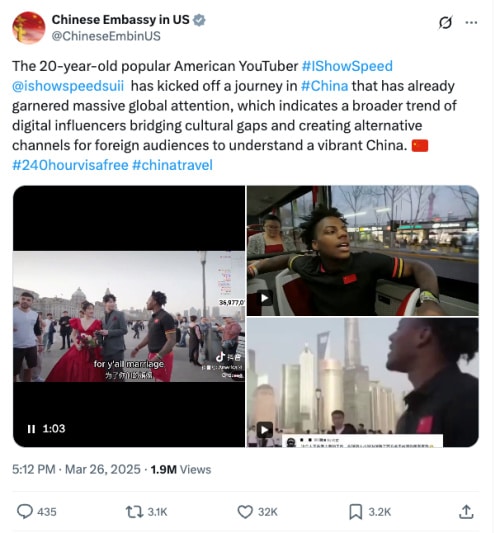
Post by Chinese Embassy in the US on X, March 26.
“This 20-year-old American internet star is bridging cultural gaps through digital means and creating new channels for foreign audiences to better understand China.”
So what exactly did IShowSpeed do while in China?
On March 24, Watkins livestreamed from Shanghai. He wandered around the city center, visited a KFC, danced with fellow streamers, stopped by a marriage market, ate noodles, played ping-pong, had hotpot, joined a dragon dance group and got acquainted with some traditional Chinese opera performance, and walked along the Bund.

On March 26, he streamed from Beijing, starting in Donghuamen before briefly entering the Forbidden City—dressed in a Dongbei-style floral suit. He later took a stroll around Nanluoguxiang and the scenic Houhai lake, rode a train, and finally visited the Great Wall, where he did backflips.

In his stream on March 28, Watkins traveled to Henan to visit the famous Shaolin Temple in Dengfeng, hoping to find a master to teach him kung fu. He trained with Shaolin monks—footage that quickly went viral.
Lastly, on March 29, he opened his own Weibo account and published his first post. On Douyin, he shared a video of his visit to Fuxi Mountain in Zhengzhou, featuring the popular “Stairway to Heaven” tourist spot.
On social media, many viewers were captivated by the content. One major talking point was the remarkably strong internet connection that allowed him to livestream for six-hour stretches without losing signal in Shanghai. (Though his Beijing stream started off patchier, the drop was minor.) For many, it symbolized the quality of China’s 5G services.
Foreign viewers also praised how safe, friendly, and clean the country appeared, and how his streams highlighted various aspects of Chinese culture—from everyday people to traditional arts and local cuisine.
🔹 Telling & Spreading China’s Stories Well
It is no wonder the success of the Jiǎkànggē livestreams is celebrated by Chinese official media in an age where China’s foreign communication aims to increase China’s international discourse power, shaping how the world views China and making that image more credible, more respectable, and more lovable.
That’s not just an observation — it’s an official strategy. Introduced by Xi Jinping in 2013, “Telling China’s Story Well” (“讲好中国故事”) is a political slogan that has become a key propaganda strategy for China and continues to be a priority in finding different ways of promoting Chinese culture — new ways of telling China’s story in the social media age – while countering Western dominant narratives about China.
In increasingly digitalized times, it is not just about telling China’s story well, but also spreading China’s message effectively — preferably through genuine and engaging stories (Cai 2013; Qiushi 2021).
Especially young, non-official ‘storytellers’ can make China’s image more relatable and dynamic. One major example, highlighted in a 2022 case study by Zeng Dan (曾丹), is Chinese influencer Li Ziqi (李子柒). You’ve probably heard of her, or seen snippets of her videos: she creates soothing, cinematic content depicting China’s countryside lifestyle, focused on cooking, crafts, and gardening. With 26 million followers on YouTube, Li Ziqi became a viral sensation who successfully communicated an authentic and appealing ‘China story’ to a broad global audience.

Li Ziqi in one of her YouTube videos.
Although the calm and composed Li Ziqi and the loud, chaotic IShowSpeed couldn’t be more different, they have some things in common: both have large international fanbases, including their millions of YouTube subscribers; they offer perspectives that differ from Chinese state media or official channels; and they have the capacity not just to tell China’s story well, but to spread it effectively through videos and livestreams.
🔹 Spontaneous Stream or Scripted Propaganda?
IShowSpeed’s China streams have triggered a wave of responses from fans and viewers, sparking discussions across international social media and even making newspaper headlines.
In English-language online media spheres, there appear to be a range of perspectives on Watkins’ China trip:
📌 One prominent view—also echoed by various foreign influencers on YouTube and other platforms—is that IShowSpeed’s visit counters “Western media lies” about China and has successfully shown the “real China” through his livestreams. The Shanghai-based media outlet Radii claimed that “IShowSpeed’s China Tour is doing more for Chinese Soft Power than most diplomats ever could.”
📌 Others challenge this narrative, questioning which dominant Western portrayals of China IShowSpeed has actually disproven. Some argue that the idea of China being a “bleak place with nothing to do where people live in misery” is itself a false narrative, and that presenting IShowSpeed’s livestreams as a counter to that is its own form of propaganda (see: Chopsticks and Trains).
📌 There are also those who see Watkins’ trip as a form of scripted propaganda. To what extent were his livestreams planned or orchestrated? That question has become one of the central points of debate surrounding the hype around his visit.
These rumors have been addressed by cameraman Slipz (@shotbyslipz), who took to X on March 28, 2025. Slipz posted that the team is “(..) not making political content, not any documentary and no journalism,” and later added: “Fact: amount of money IShowSpeed has received from Chinese Government = $0.”

But does the fact that IShowSpeed did not receive money from the Chinese government mean that it wasn’t also a form of China promotion?
➡️ Organized — it definitely was. Any media trip in China has to be. IShowSpeed would have needed a visa, he had translators with him, and throughout the streams it’s evident that local guards and public security officers were present, walking alongside and helping to keep things under control, especially in crowded areas and at major tourist spots — from Nanjing Road in Shanghai to an entire group of guards seemingly accompanying the entourage in the Forbidden City.
One logistical “advantage” to his visit was the fact that YouTube is blocked in China. While some Chinese fans do bypass the Great Firewall to access the platform, IShowSpeed remains far less known in China than in many other countries — a factor that likely contributed to how smoothly the streams went and helped prevent chaos. The team also launched a Douyin account during the trip, where he now has over two million followers. (To stream directly to their 37 million followers on YouTube, Watkins’ team either needed a VPN to access WiFi or had arranged roaming SIM cards to stay connected.)
➡️ Was it staged? Many parts clearly weren’t: casual public conversations, spontaneous barber visits in both Shanghai and Beijing (with barbers looking unsure of how to handle the situation), and wholesome fan encounters. There was even a moment when Watkins walked into a public restroom and forgot to mute the sound.
But other parts of the trip were undeniably staged — or at least framed to appear spontaneous. When visiting a marriage market in Shanghai, for instance, two actors appeared, including one woman with a sign stating she was looking for someone “capable of doing backflips.”
When Watkins took a “random” ride in what was described as the fastest car in China — the Xiaomi SU7 Ultra — the vehicle appeared to be conveniently parked and ready.
Similarly, when the streamer “ran into” Chinese-American TikTok influencer Miles Moretti (李美越) in Beijing, it turned out to be the person who would give him the now-iconic bright Dongbei flower suit and accompany him on his journey.

The ping-pong, the kung fu, the Peking opera, the hotpot, the Forbidden City tour — it all plays into the kinds of experiences that official channels also like to highlight. While likely planned by Watkins’ team in coordination with local partners, it was all far more orderly and tourism-focused than, for example, Watkins’ chaotic visit to the Netherlands.
Watkins and his entourage were also well-informed about the local dos and don’ts. At one point, Watkins even mentions “following the rules,” and when Moretti tells him mid-stream that “somebody very important lives on our left,” Watkins asks “Who?” — but the camera zooms out and the question goes unanswered, suggesting they may have been reminded that certain names or topics were off-limits (judge the moment for yourself here).
The livestream didn’t always go exactly the way Watkins wanted, either. When he attempted to take more random walks around the city, the crew appeared to be informed that some areas were off-limits, and he was asked to return to the car to continue the trip (clips here and here).
🔹 The “Nàge” Song
One major talking point surrounding IShowSpeed’s China livestreams was “the N-word.” No, not that N-word — but the Chinese filler word “nàge” or “nèige” (那个). Like “uhm” in English or “eto” in Japanese, “nàge” is a hesitation marker commonly used in everyday Mandarin conversation. It also functions as a demonstrative pronoun meaning “that.”
The word has previously stirred controversy because of its phonetic resemblance to a racial slur in English. In 2020, an American professor at the University of Southern California’s Marshall School of Business was even temporarily suspended after using the word during an online communications class — some students misunderstood its context and took offense.
The word — and the song “Sunshine, Rainbow, White Pony” (阳光彩虹小白马) by Chinese singer Wowkie Zhang (大张伟), which repeatedly features the word nàge in its chorus — popped up multiple times during Watkins’ trip. The catchy tune essentially became the theme song of his visit.
The first nàge moment actually already appeared within the first five minutes of Watkins’ Shanghai stream, when a Chinese comedian approached him on the street, trying to recall a joke. “What?!” Watkins reacted, with laughter in the background. “That’s not a joke, you said n**! It’s my first five minutes in China!” he exclaimed, before patting the man’s back in a friendly gesture, clearly not offended.
🔄 It resurfaced again within the first hour when Watkins visited a marriage market and one of the performers sang the Wowkie Zhang song. Watkins initially acted shocked, then demanded they sing it again — only to burst out laughing and start singing along.
🔄 Later, he sang the song again with a street saxophonist and encouraged others to join in.
🔄 At other moments, he played up the drama again, feigning anger when a crowd broke into the chorus, and it became a recurring gag throughout the streams.
These incidents all seem staged. One of the main reasons Watkins is known to many netizens in China is because of an older video clip showing his exaggerated reaction to the nàge song — dating back to at least 2022. So while it may have looked spontaneous, Watkins was already familiar with the word and the viral song long before his China trip.The attention given to the nàge ‘controversy’ was likely amplified for views and engagement.
While Watkins was clearly in on this part of the show — as with others — he also seemed genuinely, and at times amusingly, unaware of many things in China. He repeatedly referred to RMB as “dollars,” mistook elderly women for retired YouTube streamers, and even assumed that a woman livestreaming near the Forbidden City was reading his chat and trying to collaborate with him — although she seemed totally uninterested and was just minding her own business.
🔹 A Win-Win Situation
In the end, IShowSpeed’s visit highlighted two sides effectively doing their job. Watkins and his team successfully arranged a YouTube trip that generated high ad revenue, attracted millions of new subscribers, and boosted his brand and global fame.
On the Chinese side, there was clearly coordination behind the scenes to ensure the trip went smoothly: avoiding controversy, ensuring safety, and showcasing positive aspects of Chinese culture. From traditional opera and kung fu to ping pong, IShowSpeed’s content gave center stage to the kinds of cultural highlights that align closely with China’s official narratives and tourism goals. Even if the government didn’t pay the YouTuber directly, as his team has emphasized (and there’s no reason to doubt them), the trip still fit seamlessly into China’s soft power strategy.
IShowSpeed’s China visit has created a unique media moment that resonates for several reasons: it’s the encounter of a young modern American with old traditional China; it is a streamer known for chaos visiting a nation known for control. And it brings different benefits to both sides: clicks and ad revenue for IShowSpeed, and free foreign-facing publicity for China.
No, IShowSpeed didn’t undo years of critical Western media coverage on China. But what his visit shows is that we’ve entered a phase where China is becoming more skilled at letting others help tell its story — in ways that resonate with a global, young, online audience. He didn’t do “God’s work.” He simply did what he always does: stream. And with China’s help, he streamed China very well.
There’s so much more I want to share with you this week — from Chinese reactions to the devastating Myanmar earthquake, to a recent podcast I joined with Dutch newspaper De Telegraaf (link in Dutch, for those interested). But it also happens to be my birthday today, and I’m really hoping to still grab some birthday hotpot — so I’ll wrap this up here. I’ll keep you informed on the other trends in the next newsletter.📨.
Best,
Manya
(@manyapan)
References:
Cai, Mingzhao 蔡名照. 2013. “Telling China’s Stories Well and Spreading China’s Voice: Thoroughly Studying and Implementing the Spirit of Comrade Xi Jinping’s Important Speech at the National Conference on Propaganda and Ideological Work [讲好中国故事,传播好中国声音——深入学习贯彻习近平同志在全国宣传思想工作会议上的重要讲话精神].” People’s Daily 人民日报, October 10. http://politics.people.com.cn/n/2013/1010/c1001-23144775.html. Accessed March 29.
Qiushi 求是网. 2021. “Xi Jinping: Telling China’s Story Well, Spread China’s Voice Well [习近平:讲好中国故事,传播好中国声音].” Qs Theory, June 6. http://www.qstheory.cn/zhuanqu/2021-06/02/c_1127522386.htm. Accessed March 29.
Zeng Dan 曾丹. 2022. “How to Tell China’s Story Well: Taking Li Ziqi as an Example [如何讲好中国故事——以李子柒为例].” Progress in Social Sciences 社会科学进展 4 (1): 10–19. https://doi.org/10.35534/pss.0401002.
What’s Featured

Quite terrifying and interesting, as this trending story touched upon so many different issues.
What started as a single snarky comment on Weibo spiraled into an online witch hunt, exposing not just some dark sides of online Kpop fandom but also, most importantly, the vulnerabilities in China’s digital privacy.
Read the story, the latest by Ruixin Zhang 👀
This is an on-site version of the Weibo Watch newsletter by What’s on Weibo. Missed last week’s newsletter? Find it here. If you are already subscribed to What’s on Weibo but are not yet receiving this newsletter in your inbox, please contact us directly to let us know.
Newsletter
Weibo Watch: The Great Squat vs Sitting Toilet Debate in China🧻
This week, the Catch-22 of sitting versus squat toilets sparked heated discussion on Weibo after a Beijing News article exposed the messy reality of sitting toilets in Beijing malls.
Published
4 months agoon
March 23, 2025
PREMIUM NEWSLETTER | ISSUE #50
Dear Reader,
Shoe prints on top of the toilet seat are never a pretty sight. To prevent people from squatting over Western-style sitting toilets, there are some places that will place stickers above the toilet, reminding people that standing on the seat is strictly forbidden.

For years, this problem has sparked debate. Initially, these discussions would mostly take place outside of China, in places with a large number of Chinese tourists. In Switzerland, for example, the famous Rigi Railways caused controversy for introducing separate trains with special signs explaining to tourists, especially from China, how (not) to use the toilet.
Squat toilets are common across public areas in China, especially in rural regions, for a mix of historical, cultural, and practical reasons. There is also a long-held belief — backed by studies (like here or here) — that the squatting position is healthier for bowel movements (for more about the history of squat toilets in China, see Sixth Tone’s insightful article here).

Public squatting toilets in Beijing, images via Xiaohongshu.
Without access to the ground-level squat toilets they are used to — and feel more comfortable with — some people will climb on top of sitting toilets to use them in the way they’re accustomed to, seeing squatting as the more natural and hygienic method.

Not only does this make the toilet seat all messy and muddy, it is also quite a dangerous stunt to pull, can break the toilet, and lead to pee and poo going into all kinds of unintended directions. Quite shitty.

Squatting on toilets makes the seat dirty and can even break the toilet.
Along with the rapid modernization of Chinese public facilities and the country’s “Toilet Revolution” over the past decade, sitting toilets have become more common in urban areas, and thus the sitting-toilet-used-as-squat-toilet problem is increasingly becoming topic of public debate within China.
The Toilet Committee and Preference for Sitting Toilets
Is China slowly shifting to sitting toilets? Especially in modern malls in cities like Beijing, or even at airports, you see an increasing number of Western-style sitting toilets (坐厕) rather than squatting toilets (蹲厕).
This shift is due to several factors:
🚽📌 First, one major reason for the rise in sitting toilets in Chinese public places is to accommodate (foreign) tourists.
In 2015, China Daily reported that one of the most common complaints among international visitors was the poor condition of public toilets — a serious issue considering tourists are estimated to use public restrooms over 27 billion times per year.
That same year, China’s so-called “Toilet Revolution” (厕所革命) began gaining momentum. While not a centralized campaign, it marked a nationwide push to upgrade toilets across the country and improve sanitation systems to make them cleaner, safer, and more modern.
This movement was largely led by the tourism sector, with the needs of both domestic and international travelers in mind. These efforts, and the buzzword “Toilet Revolution,” especially gained attention when Xi Jinping publicly endorsed the campaign and connected it to promoting civilized tourism.
In that sense, China’s toilet revolution is also a “tourism toilet revolution” (旅游厕所革命), part of improving not just hygiene, but the national image presented to the world (Cheng et al. 2018; Li 2015).
🚽📌 Second, the growing number of sitting toilets in malls and other (semi)public spaces in Beijing relates to the idea that Western-style toilets are more sanitary.
Although various studies comparing the benefits of squatting and sitting toilets show mixed outcomes, sitting toilets — especially in shared restrooms — are generally considered more hygienic as they release fewer airborne germs after flushing and reduce the risk of infection (Ali 2022).
There are additional reasons why sitting toilets are favored in new toilet designs. According to Liang Ji (梁骥), vice-secretary of the Toilet Committee of the China Urban Environmental Sanitation Association (中国城市环境卫生协会厕所专业委员会), sitting toilets are also increasingly being introduced in public spaces due to practical concerns.
🚽📌 Squatting is not always easy, and can pose a safety risk, particularly for the elderly, pregnant women, and people with disabilities.
🚽📌 Then there are economic reasons: building squat toilets in malls (or elsewhere) requires a deeper floor design due to the sunken space needed below the fixture, which increases both construction time and cost.
🚽📌 Liang also points to an aesthetic factor: sitting toilets simply look more “high-end” and are easier to clean, which is why many consumer-oriented spaces prefer to install Western-style toilets.
So although there are plenty of reasons why sitting toilets are becoming a norm in newly built public spaces and trendy malls, they also lead to footprints on toilet seats — and all the problems that come with it.
The Catch 22 of Sitting vs Squad Toilets
This week, the issue became a trending topic on Weibo after Beijing News published an investigative report on it. The report suggested that most shopping malls in Beijing now have restrooms with sitting toilets, which should, in theory, be cleaner than the squat toilets of the past — but in reality, they’re often dirtier because people stand on them. This issue is more common in women’s restrooms, as men’s restrooms typically include urinals.
In researching the issue, a reporter visited several Beijing malls. In one women’s restroom, the reporter observed 23 people entering within five minutes. Although the restroom had only three squat toilets versus seven sitting ones, around 70% of the users opted for the squat toilets.
Upon inspection, most of the seven sitting toilets were dirty — despite being equipped with disposable seat covers — showing clear signs of urine stains and footprints. They found that sitting toilets being used as squat toilets is extremely common.
It’s a bit of a Catch-22. People generally prefer clean toilets, and there’s also a widespread preference for squat toilets. This leads to sitting toilets being used as squat toilets, which makes them dirty — reinforcing the preference for squat toilets, since the sitting toilets, though meant to be cleaner, end up dirtier.
In interviews with 20 women, nearly 80% said they either hover in a squat or directly squat on the toilet seat. One woman said, “I won’t sit unless I absolutely have to.” While some of those quoted in the article said that sitting toilets are more comfortable, especially for elderly people, they are still not preferred when the seats are not clean.
In the Beijing News article, the Toilet Committee’s Liang Ji suggested that while a balanced ratio of squat and sitting toilets is necessary, a gradual shift toward sitting toilets is likely the future for public restrooms in China.

How NOT to use the sitting toilet. Sign photographed by Xiaohongshu user @FREAK.00.com.
Liang also highlighted the importance of correct toilet use and the need to consider public habits in toilet design.
In Squatting We Trust
On Chinese social media, however, the majority of commenters support squatting toilets. One popular comment said:
💬 “Please make all public toilets squat toilets, with just one sitting toilet reserved for people with disabilities.”

Squatting toilets in a public toilet in a Beijing hutong area, image by Xiaohongshu user @00后饭桶.
The preference for squatting, however, doesn’t always come down to bowel movements or tradition. Many cite a lack of trust in how others use public toilets:
💬 “When it comes to things for public use, it’s best to reduce touching them directly. Honestly, I don’t trust other people…”
💬 “Squatting is the most hygienic. At least I don’t have to worry about touching something others touched with their skin.”
💬 “I hate it when all the toilets in the women’s restroom at the mall are sitting toilets. I’m almost mastering the art of doing the martial-arts squat (蹲马步).”
Others view the gradual shift toward sitting toilets as a result of Westernization:
💬 “Sitting toilets are a product of widespread ‘Westernization’ back in the day — the further south you go, the worse it gets.”
But some come to the defense of sitting toilets:
💬 “Are there really still people who think squat toilets are cleaner? The chances of stepping in poop with squat toilets are way higher than with sitting ones. Sitting toilet seats can be wiped with disinfectant or covered with paper. Some people only care about keeping themselves ‘clean’ without thinking about whether the next person might end up stepping in their mess.”
💬 One reply bluntly said: “I don’t use sitting toilets. If that’s all there is, I’ll just squat on top of it. Not even gonna bother wiping it.”
It’s clear this debate is far from over, and the issue of people standing on toilet seats isn’t going away anytime soon. As China’s toilet revolution continues, various Toilet Committees across the country may need to rethink their strategies — especially if they continue leaning toward installing more sitting toilets in public spaces.
As always, Taobao has a solution. For just 50 RMB (~$6.70), you can order an anti-slip sitting-to-squatting toilet aid through the popular e-commerce platform.

The Taobao solution.
For Chinese malls, offering these might be cheaper than dealing with broken toilets and the never-ending battle against footprints on toilet seats…
Best,
Manya
(@manyapan)
References:
Ali, Wajid, Dong-zi An, Ya-fei Yang, Bei-bei Cui, Jia-xin Ma, Hao Zhu, Ming Li, Xiao-Jun Ai, and Cheng Yan. 2022. “Comparing Bioaerosol Emission after Flushing in Squat and Bidet Toilets: Quantitative Microbial Risk Assessment for Defecation and Hand Washing Postures.” Building and Environment 221: 109284. https://doi.org/10.1016/j.buildenv.2022.109284.
Bhattacharya, Sudip, Vijay Kumar Chattu, and Amarjeet Singh. 2019. “Health Promotion and Prevention of Bowel Disorders Through Toilet Designs: A Myth or Reality?” Journal of Education and Health Promotion 8 (40). https://doi.org/10.4103/jehp.jehp_198_18.
Cao, Jingrui 曹晶瑞, and Tian Jiexiong 田杰雄. 2025. “城市微调查|商场女卫生间,坐厕为何频频变“蹲坑”? [In Shopping Mall Women’s Restrooms, Why Do Sitting Toilets Frequently Turn into ‘Squat Toilets’?]” Beijing News, March 20. https://weibo.com/ttarticle/p/show?id=2309405146044773302810. Accessed March 19, 2025.
Cheng, Shikun, Zifu Li, Sayed Mohammad Nazim Uddin, Heinz-Peter Mang, Xiaoqin Zhou, Jian Zhang, Lei Zheng, and Lingling Zhang. 2018. “Toilet Revolution in China.” Journal of Environmental Management 216: 347–356. https://doi.org/10.1016/j.jenvman.2017.09.043.
Dai, Wangyun. 2018. “Seats, Squats, and Leaves: A Brief History of Chinese Toilets.” Sixth Tone, January 13. https://www.sixthtone.com/news/1001550. Accessed March 22, 2025.
Li, Jinzao. 2015. “Toilet Revolution for Tourism Evolution.” China Daily, April 7. https://europe.chinadaily.com.cn/opinion/2015-04/07/content_20012249_2.htm. Accessed March 22, 2025.
China’s Online Discourse on the Russia-Ukraine War

In case you missed it in our earlier newsletter, we recently published the article “US-Russia Rapprochement and ‘Saint Zelensky’: Chinese Online Reactions to Trump’s Shake-Up” as part of our What’s on Weibo Chapters. For more insights into how the war is discussed on Chinese social media, you can catch up here.
Stay tuned — we’re publishing another article on this topic later this week, exploring the unexpected connection between the Russia-Ukraine war and Chinese cosplayers.
What’s Trending
🍏 Chinese Netizens Turn to Tim Cook Over Factory’s Illegal Overtime
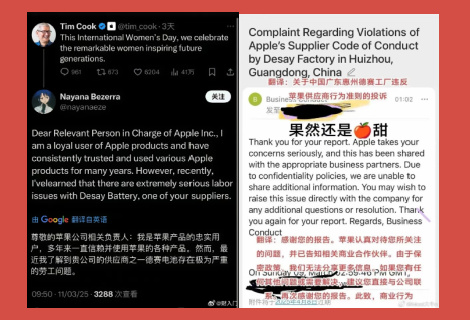
Netizens have recently started reaching out to Apple and its CEO Tim Cook in order to put pressure on a Chinese battery factory accused of violating labor laws. The controversy involves the Huizhou factory of Desay Battery (德赛电池), known for producing lithium batteries for the high-end smartphone market, including Apple and Samsung. The factory caught netizens’ attention after a worker exposed in a video that his superiors were deducting three days of wages because he worked an 8-hour shift instead of the company’s “mandatory 10-hour on-duty.” Compulsory overtime violates China’s labor laws.
In response, the worker and other netizens started to let Apple know about the situation through email and social media, trying to put pressure on the factory by highlighting its position in the Apple supply chain. By now, Desay Battery issued an official statement, admitting to “management oversights regarding employee rights protection” (“保障员工权益的管理上存在疏漏”) and promising to do better in safeguarding employee rights.
It’s an interesting story, and some commentators suggest that it shows that Chinese workers can effectively expose labor violations by reporting them to Western suppliers or EU regulators. But opinions vary. Others are less optimistic about the effectiveness, arguing that companies like Apple would be quick to drop suppliers over product quality issues but more willing to turn a blind eye to labor violations—since cheap labor remains a key competitive advantage in Chinese manufacturing.
💸 From Patriotic Influencer to Tax Evader: Sima Nan Fined More Than Nine Million Yuan

China’s well-known nationalist blogger Sima Nan (司马南) became a trending topic on Friday after being hit with a 9 million RMB ($1.2 million) fine for tax evasion. According to state media, from 2019 to 2023, he underpaid millions of yuan in personal income tax and other taxes by concealing income and submitting false declarations.
Sima responded to media, saying he fully admits guilt. At the same time he’s also blaming the multi-channel network that allegedly was in charge of paying taxes on his behalf at the time.
📌 Noteworthy: Sima Nan promised that- if he’ll still be allowed to have his social media presence – he would in detail explain how he ended up becoming a tax evader. This is kind of funny, because it shows just how good he is in what he does, turning his PR crisis into an opportunity for clicks and views 📈 (yes we do want to know how he went from patriotic influencer to becoming a multi-million tax dodger).
📌Public reaction: The most recurring comments I’ve seen on Weibo is that people are amazed at his high income. They note the hypocrisy of a nationalist, patriotic influencer who’s always preaching truth & justice evading taxes himself, and also conclude that being a nationalist is truly a money-making business🤑🇨🇳
💔 Tragedy at Hubei University: Zhang Yuzhen’s Disappearance and Aftermath

The disappearance of 19-year-old Chinese student Zhang Yuzhen (张钰臻) has captured nationwide attention this week. Zhang did not return after leaving her campus at Hubei University around 5 p.m. on March 15. Her phone remained traceable until 5:54 p.m., about one kilometer from campus. The case became a hot topic as millions of netizens turned into online sleuths, searching for clues that might lead to Zhang’s whereabouts.
On the afternoon of March 20, it was reported that Zhang’s personal items — including her keys and glasses — were discovered by a passerby next to a lake near the university. Police then began searching the lake. By that evening, her remains were found. The case is still under investigation.
There has been some online criticism regarding how the university handled Zhang’s disappearance. Although she was last seen on March 15, it wasn’t until March 18 that her parents were notified by a school counselor. They then reported her missing to the police, after which the school began cooperating with the investigation.
Now, there is also much discussion surrounding the behavior of Zhang’s mother, who has been publicly expressing her grief and anger on Douyin. After learning of her daughter’s death, she became emotionally distraught — screaming, crying, and demanding answers. She seemingly caused some public disturbance when she was prevented from immediately seeing her daughter’s remains, and was also not allowed to leave her hotel (perhaps due to concerns over her emotional state, though details remain unclear at this time). While some online voices have criticized her behavior, many are calling for empathy, arguing that any mother who has just lost her child would be desperate and distraught.
What’s Noteworthy

“The world is so big, I want to go out and see it” (Shìjiè nàme dà, wǒ xiǎng qù kànkan “世界那么大,我想去看看”).
This ten-character sentence became part of China’s collective social media memory after a teacher’s resignation note went viral in 2015. Now, a decade later, the phrase has gone viral once again.
In April 2015, the phrase caused a huge buzz on China’s social media when the female teacher Gu Shaoqiang (顾少强) at Zhengzhou’s Henan Experimental High School resigned from her job. Working as a psychology teacher for 11 years, she gave a class in which she made students write a letter to their future self. The exercise made her realize that she, too, wanted more from life. Despite having little savings, she submitted a simple resignation note that read: “The world is so big, I want to go out and see it.”
The resignation letter was approved, and she posted it to social media.
The letter resonated with millions of Chinese who felt they also wanted to do something different with their life, like go and travel, see the world, and escape the pressures and routines of their daily life. The phrase became so popular that it was adapted in all kinds of ways and manners, by meme creators, in books, by brands, and even by Xi Jinping, who said: “China’s market is so big, we welcome everyone to come and see it” (“中国市场这么大,欢迎大家都来看看”).
This week, Lěngshān Record (冷杉Record), the Wechat account under Chinese media outlet Phoenix Weekly (凤凰周刊), revisited the phrase and published a short documentary about Gu’s life after the resignation and the hype surrounding it.
An earlier news article about Gu’s life post-resignation already disclosed that Gu, despite receiving many sponsorship deals, never actually extensively traveled the world. In the short documentary, Gu explains that she chose to “return home after seeing the world.” By this, she doesn’t mean traveling extensively abroad, but rather gaining life experience in a broader sense. While she did travel, it was within China, including in Tibet and Qinghai.
What truly changed was her life path. She left Zhengzhou and relocated to Chengdu to be near Yu Fu (于夫), a man she had met just weeks earlier by chance during a trip to Yunnan. Six months after the resignation letter, she married him. Together, they ended up opening a hostel near Chengdu, married, and had a daughter.
Gu, now 45 years old, has been back in her hometown of Zhengzhou for the past years, caring for her aging mother and 9-year-old daughter. She is living separately from her husband, who manages their business in Chengdu. She also runs her own livestreaming and online parenting consultancy business.
Although the woman who wanted to “see the world” ended up back home, she has zero regrets about what she did, suggesting her courage to step out of the life she found limiting ultimately transformed her in a meaningful way.
On Chinese social media, the topic went trending on March 19. Most people cannot believe it’s already been ten years since the sentence went trending (“What? How could time fly like that?”). Others, however, wonder about the hopes and dreams behind the original message—and how it all turned out.
💬 “Seeing the world? She just escaped her old life, got married, and had a baby. How is that ‘seeing the world’?” one commenter wondered (@-NANA酱- ).
💬 “The world is so big—what did she end up seeing?” others questioned. “She went from Zhengzhou to Chengdu.”
💬 “Seeing the world takes money,” some pointed out.
💬 But others came to her defense, saying that “seeing the world” also means stepping out of your comfort zone and exploring a different life. In the end, Gu certainly did just that.
💬 “She was quite courageous,” another commenter wrote: “She gave up a stable job to go and see the world. Perhaps her life didn’t end up so rich, but the experiences she gained are priceless.”
The world is still big, though, and there’s plenty left for Gu Shaoqiang to see.
Also read what we wrote about this in 2015: In The Digital Age, ‘Handwritten Weibo’ Have Become All The Rage
What’s Memorable

📚 This pick from our archive is from last year, about Fan Zeng (范曾), the famous Chinese calligrapher, who is turning 87 soon and has a wife 50 years his junior.
This week, some videos featuring Chinese theoretical physicist & Nobel Prize winner Yang Chen-Ning (杨振宁) circulated on social media. Yang is turning 103 this year. Still sharp of mind, and he takes a walk every day.

Yang Chen-ning
In this interview here, when asked about the secret to his longevity, he points to one thing above all: luck.
🍀 Mostly, he suggests it’s the luck of good genes. On his father’s side, diabetes was common, but he was fortunate to inherit his mother’s genes in that regard.
🍚 He also mentions the luck of never experiencing extreme hunger during wartime — he lived in Kunming during those years.
💪 And then he stresses the importance of taking walks, every day, since he was about 70. Keep moving, keep the blood flowing!
What he doesn’t mention, however, is that his wife, Weng Fang (翁帆), is 54 years (!) his junior — I’m pretty sure she helps keep him young too…
Fan and Yang are good friends, and Yang’s good health might have inspired him to marry his 50-years-younger girlfriend last year. Read more 👇
This is an on-site version of the Weibo Watch newsletter by What’s on Weibo. Missed last week’s newsletter? Find it here. If you are already subscribed to What’s on Weibo but are not yet receiving this newsletter in your inbox, please contact us directly to let us know.
Popular Reads
-

 China Society10 months ago
China Society10 months agoDeath of Chinese Female Motorcycle Influencer ‘Shigao ProMax’ Sparks Debate on Risky Rides for Online Attention
-

 China World11 months ago
China World11 months agoChina at Paris 2024 Olympics Trend File: Medals and Moments on Chinese Social Media
-

 China Memes & Viral11 months ago
China Memes & Viral11 months agoTeam China’s 10 Most Meme-Worthy Moments at the 2024 Paris Olympics
-

 China Memes & Viral12 months ago
China Memes & Viral12 months agoAbout Wang Chuqin’s Broken Paddle at Paris 2024






